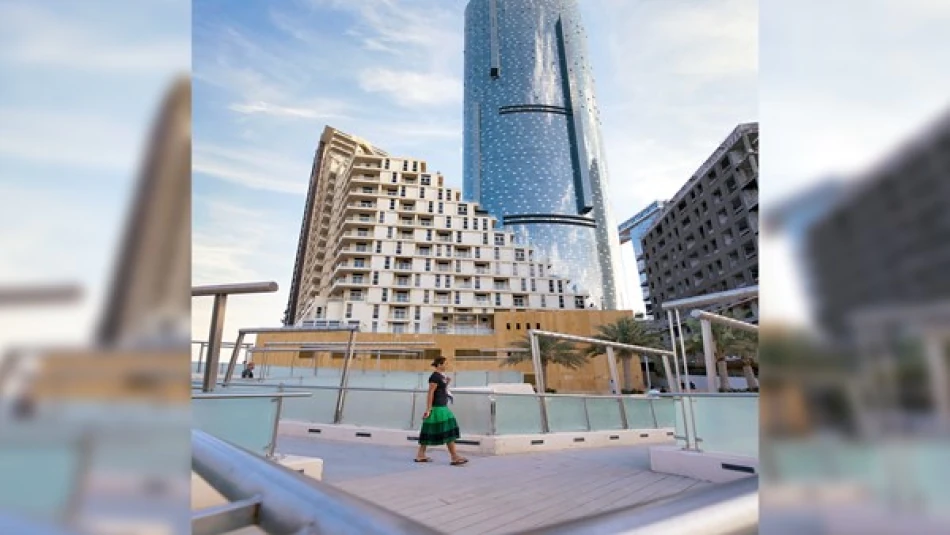
UAE's Abu Dhabi and Dubai Lead Demand for Smart City Solutions
UAE Cities Lead Middle East's AI-Powered Smart City Revolution
Abu Dhabi and Dubai have emerged as the dominant forces driving demand for AI-enabled smart city solutions across the Middle East and North Africa, positioning the UAE at the forefront of a technological transformation that promises to reshape urban living while delivering massive economic returns. With the global smart cities market projected to explode from $848 billion in 2025 to $5.6 trillion by 2035, the Emirates are strategically positioning themselves to capture a significant share of this unprecedented growth.
The Technology Behind the Transformation
Smart cities leverage a sophisticated ecosystem of artificial intelligence, Internet of Things (IoT) devices, and big data analytics to revolutionize urban management. These technologies work in tandem to optimize resource utilization, streamline transportation networks, and enhance infrastructure efficiency while dramatically reducing carbon footprints and energy costs.
Sebastian Doy, CEO of Shoreflow, a company specializing in carbon footprint reduction innovations, explains that the integration of sensors and real-time data analysis enables cities to make intelligent decisions about resource allocation and infrastructure management. This approach mirrors successful implementations in Singapore and Copenhagen, but the UAE's execution has been particularly aggressive and comprehensive.
Abu Dhabi's Remarkable Ascent in Global Rankings
The results speak for themselves. Abu Dhabi catapulted from 10th place in 2024 to 5th position in the 2025 Smart Cities Index published by the International Institute for Management Development (IMD). This dramatic improvement places the emirate ahead of numerous major global capitals, a achievement driven by strategic investments in green spaces, free Wi-Fi infrastructure, advanced public transportation systems, and sophisticated traffic management solutions.
This ranking improvement represents more than prestige—it signals to international investors and technology companies that the UAE offers a mature, receptive market for smart city innovations. The rapid advancement suggests that Abu Dhabi could challenge traditional leaders like Singapore and Zurich within the next few years.
Carbon Reduction at the Core
The UAE's smart city initiatives align perfectly with the country's Energy Strategy 2050, which targets significant reductions in carbon emissions and increased renewable energy adoption. Smart cities achieve these goals through intelligent power grids, renewable energy projects, and comprehensive electric vehicle infrastructure.
The integration of 5G technology enables faster data transmission, supporting autonomous vehicle infrastructure and facilitating green building certifications like LEED. This holistic approach differentiates the UAE from other regional players who may focus on individual smart city components rather than comprehensive ecosystem development.
Market Implications and Investment Opportunities
The numbers reveal the scale of opportunity ahead. The global smart cities market is projected to grow at a compound annual growth rate of 28.2% over the next decade—a rate that would make it one of the fastest-growing technology sectors globally. For investors and technology companies, this represents a rare convergence of government commitment, market demand, and technological readiness.
Unlike previous technology adoption cycles, smart city implementation requires substantial government coordination and long-term planning. The UAE's demonstrated ability to execute large-scale infrastructure projects, combined with its strategic location as a gateway between East and West, positions it as an ideal testing ground and showcase for smart city technologies.
Competitive Landscape and Regional Leadership
While Saudi Arabia is also investing heavily in smart city initiatives through projects like NEOM, the UAE's advantage lies in its existing urban infrastructure and established international business environment. Dubai and Abu Dhabi can implement and refine smart city solutions in functioning metropolitan areas, providing real-world validation that purpose-built smart cities cannot immediately offer.
The focus on practical applications—traffic management, energy efficiency, public safety, and healthcare optimization—demonstrates a mature understanding of smart city priorities. This contrasts with more speculative approaches that emphasize futuristic concepts over immediate urban challenges.
The Path Forward
The UAE's smart city success stems from treating technology as a means to solve specific urban problems rather than as an end in itself. By prioritizing citizen quality of life, operational efficiency, and environmental sustainability, Dubai and Abu Dhabi have created a replicable model that other emerging economies are likely to study and adapt.
As governments worldwide grapple with rapid urbanization and environmental concerns, the UAE's integrated approach to smart city development offers a blueprint for sustainable urban growth. The projected market expansion to $5.6 trillion by 2035 suggests that early movers like the UAE will capture disproportionate value from this technological transformation, cementing their position as regional innovation hubs for decades to come.
Most Viewed News

 Layla Al Mansoori
Layla Al Mansoori






